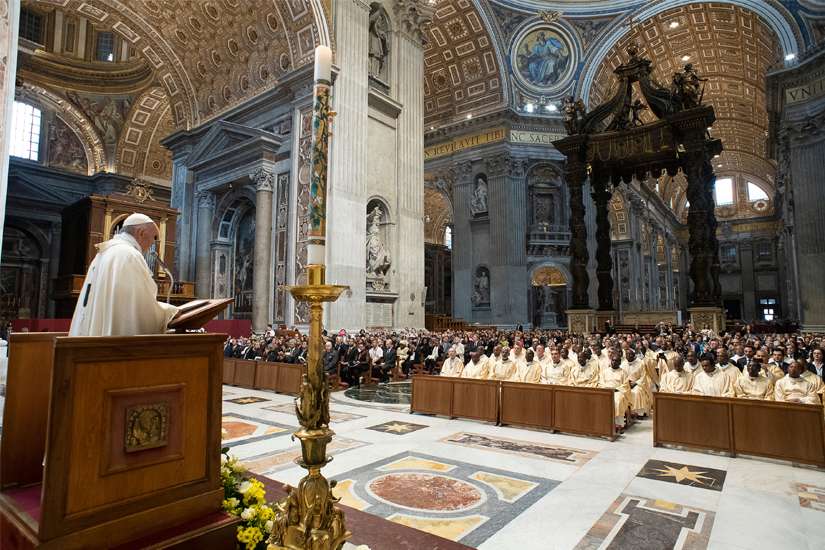Opening the general assembly of Caritas Internationalis, the Vatican-based federation of national Catholic charities, Pope Francis celebrated Mass May 23 with some 450 delegates from around the world.
Gathered at the Altar of the Chair in St. Peter's Basilica, Pope Francis told the very large aid and development agencies, like the U.S. Catholic Relief Services, and the very small agencies, like Caritas Bangladesh, that they must follow the promptings of the Holy Spirit and avoid the temptation of "efficiencyism" and of "worshipping ourselves and our goodness."
Christians are called to love as Jesus loved, giving up everything, including control, the pope said.
"Jesus asks us to remain in him, not in our ideas; to leave behind a desire to control and run things," he said. "He asks us to trust one another and give ourselves to the other."
Looking at the Mass' first reading, Acts 15:7-21, in which the early Christian community was debating how much of Jewish law must be adopted by new Christians coming from among the Gentiles, Pope Francis said some might ask why Jesus had not given his disciples clear instructions on that for the future.
That, he said, is a sign of "efficiencyism, of thinking that the church is doing well if it has everything under control, if it lives without any jolts, if its diary is always in order."
But Jesus did not live that way and he did not create the church to live that way, the pope said.
Faith "is a path to follow together, always together, with a spirit of trust," he said.
Humility in listening to others and a willingness to let go of things or ideas is essential in following Jesus, the pope said. "God purifies, simplifies, often makes us grow by cutting, not by adding as we would."
And while the Caritas agencies must have professional standards and respond to donor's expectations, he said, the church is not a business, but a community committed to living and proclaiming the Gospel.
"For one who wants to follow the path of charity, humility and listening mean turning an ear to the little ones," the pope said. "In the world, those who have more speak more, but among us it cannot be that way because God loves to reveal himself through those who are small and last."
"People before programs!" Pope Francis told the delegates.
Catholics, especially when exercising charity in the church's name, must be humble enough to "seek in others the presence of God, who does not dwell in the greatness of the things we do, but in the smallness of the poor we encounter."
"If we do not look directly at them," he said, "we end up always looking at ourselves and making them instruments of our self-affirmation."
In the Gospel, Jesus tells his disciples to "remain in my love," the pope told the delegates. The only way to do that is to stay close to Jesus in prayer and in service to the poor.
"We will be helped by staying before the tabernacle and before the many living tabernacles who are the poor," he said. "The Eucharist and the poor, the fixed tabernacle and the mobile tabernacles: It is there that we remain in love and absorb the mentality of bread broken," that is of Jesus, who gives himself in the Eucharist.


